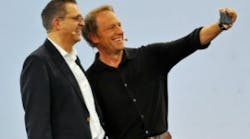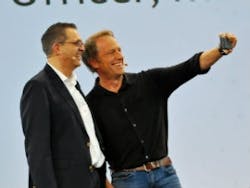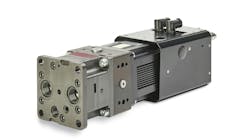Mike Rowe, former host of "Dirty Jobs" on the Discovery Channel, and presently CEO of mikeroweWorks.org, snaps a selfie with Sami Atiya, global president of robotics and motion at ABB, during their keynote address on the closing day of ABB Customer World 2019 in Houston.
Work may change, but it's not going away. Some retooling, education and collaboration are needed, as they always are when new technologies and methods arise, but we know what to do to solve these problems, explained the two "Future of Work" keynote speakers on the closing day of ABB Customer World 2019 this week in Houston.
"Adapting to new technologies helps the prosperity of companies and their communities, and is not a threat," said Sami Atiya, global president of robotics and motion at ABB. "Productivity and flexibility are needed to meet the demands of customers, but they can also create new and better jobs."
Atiya explained that protests against new technologies like robotics and machine learning (ML) are not new, but people don't need to be worried because they often take decades to reach the mainstream. "I helped develop a robotic system with ML about 25 years ago, so I know there's not a super race of robots that's going to come and crush us," said Atiya. "These are just new tools that we can learn to use. In fact, ABB introduced the first microprocessor-controlled robot in 1974, and it represented a significant advance because users could program it directly, instead of replacing cassettes."
Atiya reported there are presently about 2.5 million robots in service worldwide, but 400,000 were deployed in the past year, which indicates just how quickly they're gaining ground. ABB has pioneered safe-motion capabilities like its SafeMove2 software and YuMi inherently safe robot to make human interactions with robots far safer than just a few years ago.
"Customers are also asking us to make robots that are simpler to use," he added. "It's a huge driver for us. Now, users can even program our robots using a virtual reality (VR) headset, and we think this will help create more new and different types of jobs, and allow people with different types of education to bring value. Plus, we're the only company in the world manufacturing robots in the U.S. at our new facility near Detroit in Michigan."
Customization for consumers
Atiya added that robots and people must collaborate to meet the insatiable demands of consumers, who want everything from individually printed M&Ms to 200 different varieties of yogurt. "Machines that used to be asked to fill 100 bottles of beer per minute are being tasked with putting different types of beer in each bottle and a different label on each bottle, and do it at the same speed," said Atiya. "This isn't easy, but it is possible.” Previously, new technologies came from industry to consumers, he said, but now that's reversed, and solutions are coming from the consumer side to industry.
For example, ABB recently worked with a customer that wanted to build a robot-aided production line in just sixteen weeks. This would normally be impossible, but Atiya reported that ABB was able to make it happen by simulating the line and its performance using its RobotStudio software.
"We simplified and reduced the engineering needed because we didn't have to build a prototype, and were able to get this project up and running in time," he said. "These are just the kind of new and enriching jobs that robotics and digitalization can make possible. Ten years ago, it would takes months of training for a worker to assemble a car door, but today they can use a VR headset to learn and perform these jobs more quickly. Our U.S. robotics facility is bringing these kinds of training to our staff, too."
Essential enthusiasm
Beyond reassuring people that automation won't eliminate jobs, even though it may alter them and require workers to learn new skills, Atiya concluded that it's important for companies and people to get enthusiastic about these new professional opportunities. "Global competition is forcing everyone to get involved with robotics and other new technologies, but they really can result in new and exciting jobs," added Atiya.
The second keynoter, Mike Rowe, former host of "Dirty Jobs" on the Discovery Channel, and presently CEO of mikeroweWorks.org, added that, "At a time when we've never been more connected by technology, we've also never been more disconnected from what matters most.” During the 2008-09 recession, there was close to 10% unemployment, but still 2.5 million good jobs that no one was excited about, Rowe said. In the years since, the number has grown to 7 million unfilled jobs. “About 75% of these don't require college, just training. This situation isn't a skills gap. It's a will gap."
As a result, Rowe proposed that we as a society need to change the attitude that all students should go do college four a four-year degree, and that they've settled for some kind of consolation prize or "got stuck in manufacturing" if they don't go to college.
"The path to prosperity usually begins with a skill," said Rowe. "Robots are coming, but the conversation about them has become pixilated and confused. Technical advances will displace and change jobs, but there are 7 million unfilled ones out there now. We just need to make a presentable case for them."






